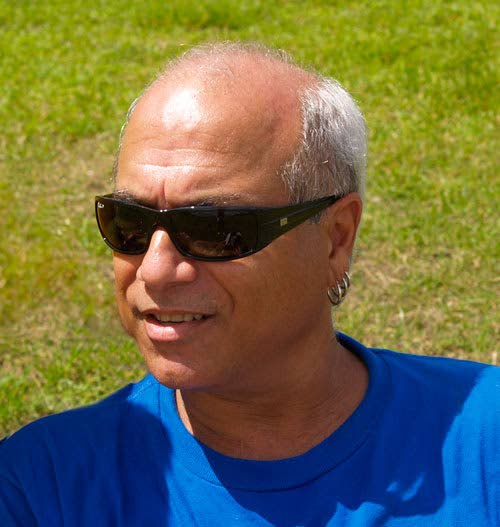Raymond Choo Kong, Bent

THANK GOD IT’S FRIDAY
EVERY ONE OF us knows someone who has been murdered. Even within my own fairly privileged social position, I’ve had Christmas or New Year’s Day lunch with three people – brother and sister Henry and Candace Carrington and Michael Jobity – who’ve been slaughtered, like meat, Candace and Michael in their own homes. My friend Kath counts 18 people, including her own father, murdered in Trinidad.
In Tobago, the last time I counted, seven elderly white couples had been chopped to death in their own homes, a statement of simple fact that, in a real country, would have led to a systematic hunt for what would be seen to be a clear serial killer; in Tobago, police routinely arrest and release the village cocaine-piper when they reluctantly concede that they cannot give him seven cases of double murder.
In Trinidad, when it comes to crime in any form, we’ve learned to expect nothing from anyone anymore, even Double-G, continually riding in on his white charger. Children can be murdered accidentally, mere collateral damage, or obviously targeted as serious players in gangland executions.
Child soldiers break our hearts but child gangsters come like PH taxis: without them, the system just wouldn’t function. We raise an eyebrow, perhaps, but not an expectation; we “done know” that no arrest will be made, no case proven, no justice seen to be done.
The writer Oonya Kempadoo caught our predicament in a perfectly-realised scene in her third novel, All Decent Animals, set in Trinidad: police investigating a theft at a Lady Chancellor Hill home decline to cross the lawn leading to the track where the thief escaped because to do so would necessitate getting their shiny shoes wet by the dew on the grass! They can see the track from the dry porch, thanks.
What point is there in looking closely at a thing you can see well enough from far? Ex-specially if it risks your trouser crease?
What breaks our hearts this week is not that Raymond Choo Kong, one of our great actors, was murdered; it is that we do not need the passage of ten months, ten years or ten lifetimes to know what we already know today: that he will have died for nothing.
Our newspapers know something our police do not: that there is a serial killer stalking gay men. Police put their noses in the air to declare they don’t have statistics about the murders of homosexuals because they don’t judge anybody; what would be, in a real country, a clear hate crime becomes, in Trinidad, proof that the police force is not homophobic!
You could die laughing.
Raymond Choo Kong was deservedly recognised for the full houses his localised farces played to, but he was even more important for two serious reasons.
First, for a time, he kept theatre itself in Trinidad alive (as others, like Helen Camps and Lennox Raphael, have done) by creating a space for it – the Space at Bretton Hall – when there was none. If life truly is but a stage, we sometimes had no life at all in our capital city.
And, second – and how I will remember him – for the role he played in Helen Camps’ Tent Theatre production of Samuel French’s Bent, the play from which I learned that the only group more despised than Jews in Nazi concentration camps in World War II were the homosexuals. It may be that, in Hitler’s Germany, rather than Anderson Cooper’s CNN, they wore their pink triangles without shame, if not with pride, and at a time when the word would not be capitalised, far less recognised as emblematic of human rights, as in Pride TT.
Actors draw on both their gift and their experience. In Bent, Raymond Choo Kong personified, live on stage, all the persecution his kind – our kind, humanity itself – has suffered down through the ages; and reasserted the power of love, the only thing that will defeat hate. Would that we lived in a place where the serious statement of Bent would have been appreciated as much as the distraction of the farce of Boeing Boeing; had we created and lived in that space, Raymond might not have died in the place and the way he did.
Eugene O’Neill, the American playwright, said there is no present or future, just the past happening over and over again; he could have been from Trinidad, where this week’s present has, once more, caught up with our past.
We will see, every day from now on, whether our past remains our future.
BC Pires is downcast and out in Paris and London and Port of Spain


Comments
"Raymond Choo Kong, Bent"